I had the opportunity to go to Iran twice, with an interval of 9 years. The country I went to by air in the first and by road in the second had changed little in 9 years. These are the details that caught my attention in Iran during my travels, and those that may be useful to you. What you need to know before going to Iran list, Iran travel notes I got it under. Does Iran require a visa, how they look after the Turks, what they eat and drink, how they live, what to watch out for as a tourist and a lot of useful information about daily life in Iran are waiting for you in this article!
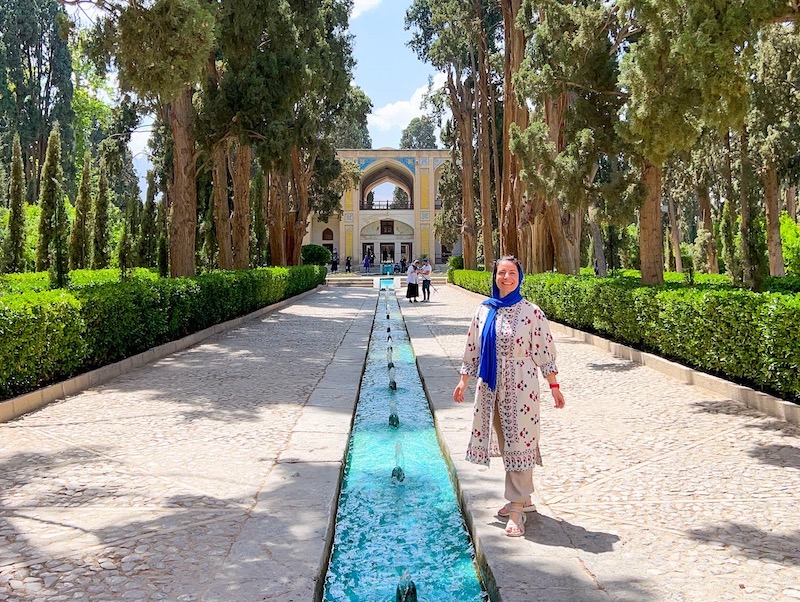
Does Iran Require a Visa?
If you are thinking of going to Iran, the first thing we need to know is of course the visa application. Iran does not require a visa from Turkish citizens for up to 90 days. You can only enter Iran with your passport.
However, if you have an Israeli visa in your passport, if you have entered and exited Israel, Iran will not allow you to enter the country. If you have a plan to go to Iran after Israel; issuing a new passport would be the most reliable method.
How to get a second passport? My post will be very helpful to you.
Is Passport Stamped When Entering Iran?
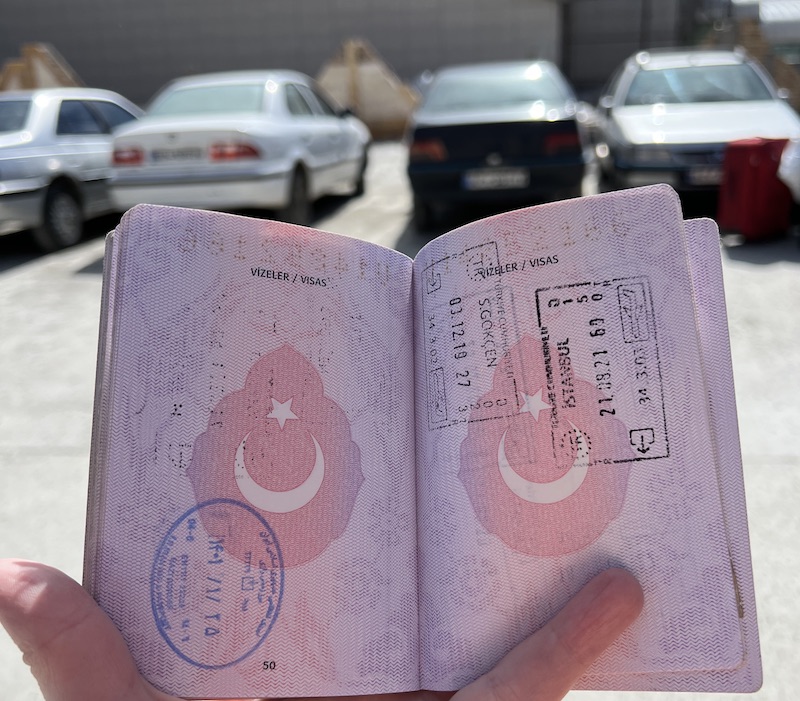
Frankly, it is difficult for you to achieve a standard in many issues in Iran. For this reason, the issue of stamping the passport is also in doubt.
- If you are coming to Iran by air; Your passport is not stamped with an entry stamp.
- If you are coming to Iran by road; An entry stamp is printed on your passport.
You will ask why this stamp is important, if you have an entry stamp to Iran in your passport, you are likely to have trouble entering the United States. Therefore, if your travel plans include going to the United States, a second passport will be a good alternative.
Living with Sharia in Iran
Iran, beautiful Iran... An Islamic Republic, a country of sharia, founded on the legacy of an ancient civilization...
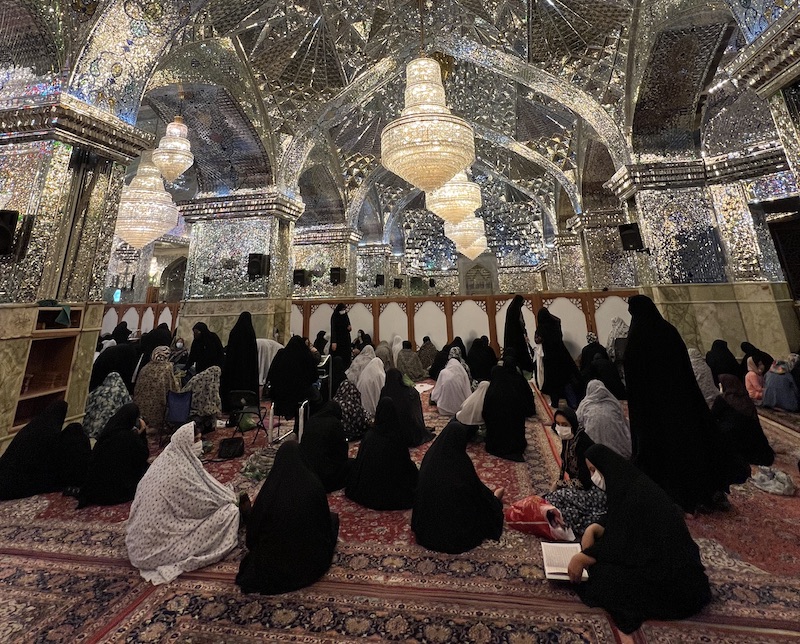
One of the most asked questions to me when I was in Iran was the living conditions of people, especially women. Let me make a summary by combining my observations about being a woman in Iran with the stories of the Iranian women I talked to:
First of all, women in Iran are involved in social life and are very active. You can see groups of women going out in the evening, young girls going on vacation together, you can get into the cars of female taxi drivers. These are the rosy parts of the job.
All women in Iran (regardless of whether they are domestic or foreign) have to cover their heads. Although it is not a very tight cover, it is a necessity. If you are caught by the police with your head uncovered (depending on the police, there may be those who turn a blind eye or just warns) you are detained and punished.
Women are often second-class citizens before the law. Perhaps the only practice that favors women is that the man pays the woman high compensation in case of divorce. Iran, the geography where Zoroastrianism, which advocated the equality of men and women 3500 years ago, emerged, and look at the point reached today.
It is forbidden for women to sing or dance in Iran. At the end of a civilization in which music occupies an important place in its culture, female singers cannot enter their country.
All the women I spoke to said that there was too much pressure on them, that they were very unhappy and that they wanted to leave Iran. Many educated Iranian men and women who get the chance are leaving their country. There are also many men who are upset about the situation of women, men who support their wife because she wants to leave the country, and men who do not have a heart for their wife's situation.
This oppressive regime has alienated everyone from religion, and if people could express their true opinions, the rate of irreligious in the country would be quite high. However, it is not possible for anyone to officially disclose this information.
Unfortunately, no one in the country believes that things will get better. Those who take the slightest dissent are taken from their homes and are never heard from again. There have been incidents where around 1800 people disappeared at once. That's why nobody can speak up. Unfortunately, there is a large segment of people who have lost hope and see the only solution as leaving their country.
The country's economy is getting worse day by day. Despite the fact that they have very serious natural resources in their hands due to international embargoes and poor economic management, they cannot benefit from it.
I met very nice people who deserve to live well in Iran. I hope they get the humane life they deserve as soon as possible...
Is Turkish Spoken in Iran?
Turkish is a very common language in Iran, as it approaches the Turkish border, the rate of speaking Turkish reaches 80% in parallel with the Azeri population in the northwest of the country. It is around 50% in Tehran, the rate decreases as you go down. The Turkish they speak is very understandable, so it is very easy to communicate.
The number of people who are not Azerbaijani but speaks and learns Turkish is very high. Thanks to Turkish TV series, I met many people who learned Turkish. I still don't understand how a person learns a language by watching TV series...
Another convenience to communicate in Iran is that there are so many common words between Turkish and Persian. As we go to the south of the country, the rate of speaking English with tourists increases, but sometimes when I couldn't understand English, I turned to Turkish directly.
Attitude Towards Turks In Iran
Iranians love Turks very much. When they hear that we come from Turkey, they switch to the phrase "we are brothers". Before the economic crisis, they used to go to Turkey a lot. We are like a dreamland for them. I have experienced a similar situation in other countries in the Middle East.
Too many Turkish groups live in Iran. There are not only Azeris, but also Turks from different tribes in different parts of the country. After the Azeris, the Hamadan Turks and the Kashkay Turks were the ones I encountered the most.
Iranians are generally very friendly. Especially when we say we came from Turkey, they invite us to a tea. Turkish serials are very popular in Iran. If you want to have a common point, it would be useful to learn a few TV series.
Iranian Currency
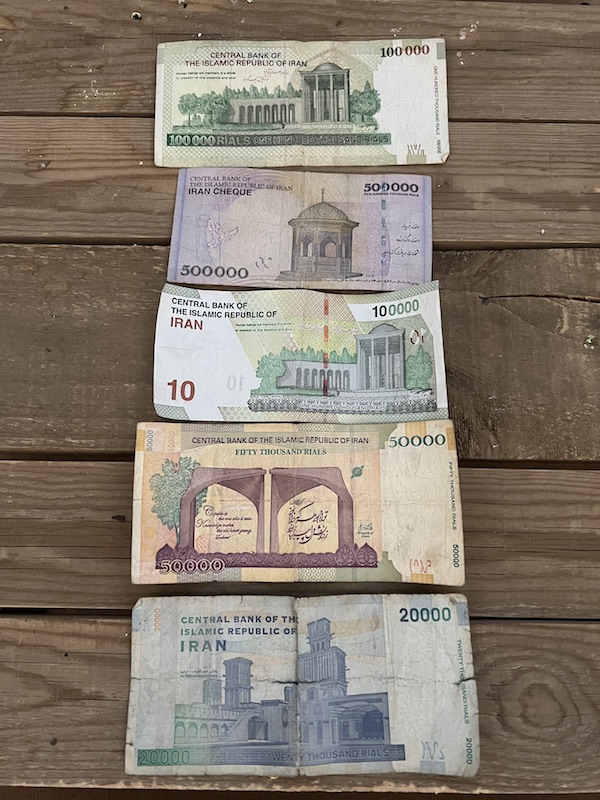
Did I mention that it is quite difficult to find a standard in any subject in Iran? This standardlessness is reflected in the currency. picture of iran currency rial, but used by subtracting one zero from the street currency Riyal Divisional. It will be said as 90% Tumen when you are quoted outside, but there will be people who say Riyal when they see you are a tourist.
In order to prevent the Tyumen-Riyal confusion, arrangements were made on some banknotes to make them easier to read. For example, if you look at 100.000 Riyals in the photo above, you will see that the "10" part is decomposed at the beginning and 10 is written in the lower left corner of the coin. That's 10 thousand divisions. As if the Riyal-Tyumen conversion wasn't complicated enough, it was great (!) that they dropped zeros from the Division and wrote it on the money.
Another reason for money confusion is that the same coin has different banknotes. So there are several versions of 500.000 Riyals with different banknote sizes and colours. While it is already difficult to solve the money issue, these banknotes are also confusing. Since Iranians are used to this mess, they definitely help you while you pay.
Another confusion regarding the Iranian currency is that the Riyal rate is almost half the difference between the official rate and the street rate. If you exchange currency at the bank, you will make a big loss because the official exchange rate will be applied, so the most suitable places to exchange foreign currency are exchange offices. There are also people who exchange foreign currency on the street, but they can have risks such as counterfeit money, the safest is exchange offices.
Credit Card Usage in Iran
You cannot use Visa, Mastercard, American Express credit cards (with a few exceptions) in Iran. In cases where you use a card, collections are made at the official exchange rate, which puts you in half a loss. For this reason, you need to take the money you will need with you in cash when you go to Iran. You can take USD, Euro or TL with you. You may not be able to exchange Turkish Lira everywhere, the best guarantee is to bring Euro or Usd.
Is Iran Safe?
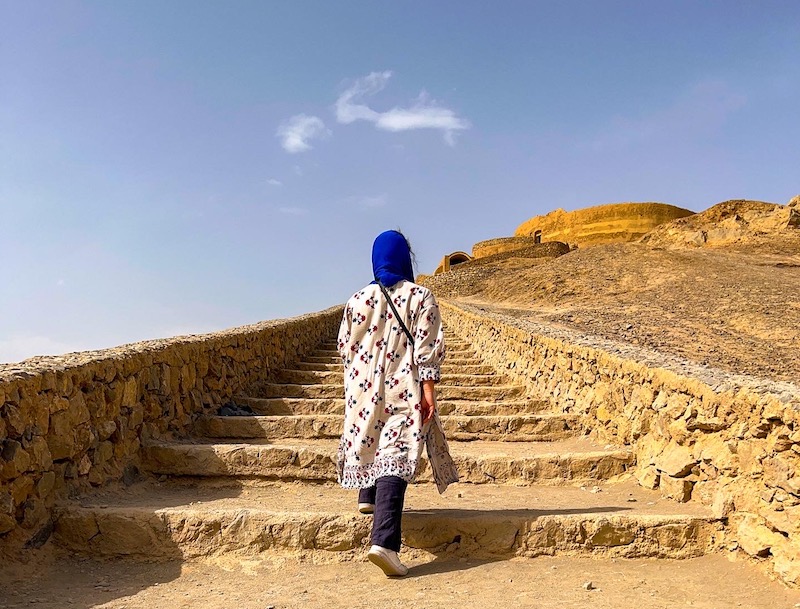
The implementation of sharia laws in Iran has one benefit, and that is the low crime rate in the country due to heavy penalties. Iran is one of the countries where I feel safest when traveling alone as a woman. Even late at night, the streets are lively and safe.
Still, it is worth remembering that, due to economic restrictions, the currency in Iran has lost 3 times its value in the last 10 years, so there is a serious impoverishment. In recent years, the thefts brought on by this impoverishment, never seen before, have started. It is also said that there is an increase in crime rates due to immigrants from Afghanistan and Pakistan.
The only place where I felt uncomfortable in Iran was Tehran, let's say that is an uneasiness that can be experienced in a crowded city independent of Iran. You can feel strange glances in the crowd from time to time, but I often come across those looks in Istanbul as well.
Best Time to Go to Iran
If you want to see the Tehran-Isfahan-Shiraz-Yezd line, which is the popular route of Iran, the best time to go is April-May. After May, temperatures can reach unbearable levels in the middle and south of the country. If you plan your trip to coincide with Nowruz in April, you will have the chance to see the most active period of the country, but due to the high season, the prices are higher and there may be difficulties in finding a place in the hotels.
If you are thinking of going to the islands in the south of the country; then you should definitely prefer the winter months. For the Persian Gulf and the coasts of the Indian Ocean, the winter months (when it is winter in Turkey, the temperatures will be like spring) are the best times to go.
If you want to have a completely different experience in Iran, Gorani Kurds living in the Hewraman region of Iran's Kurdistan province hold a representative wedding in the January-February period in which they commemorate Pir Şaliyar. I didn't go but if you want to go Atlas Magazine's Wedding of Pirs Check out the article.
Transportation in Iran
There are many domestic transportation options in Iran and it is also affordable because gasoline is very cheap in the country.
For intercity transportation in Iran; You can consider one or more of the bus, train, plane, car rental or chauffeured car (taxi) options.
Traveling by Taxi in Iran
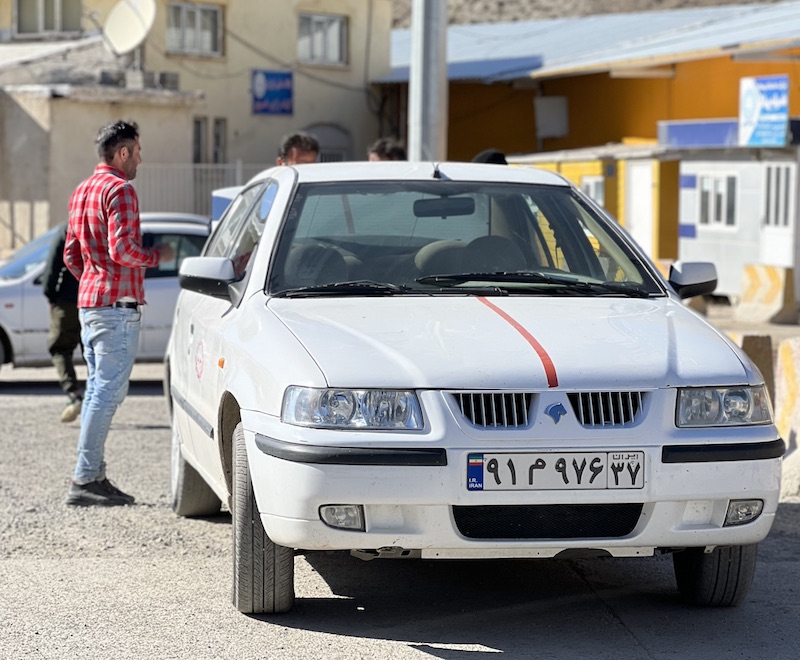
I did all my transportation in the city by taxi. If you turn taxis from the road, you have to say where you are going and bargain. They usually give discounts. However, there is an Uber-like taxi application that you can use in Iran; Snapp. When you book a taxi through this application, it is even cheaper than half of the prices you convert from the road. In order to use the Snapp taxi application, you must have an Iranian GSM line. snapp.ir You can access the application via the address. Snapp app also has an English option.
It is very common to use taxis for intercity trips in Iran. This part is completely negotiable. For example, when I was going from Kashan to Isfahan, I wanted to stop by Abyaneh, so I added a few more stops and took a taxi there, and from a nearby city to Isfahan, I took a taxi. This trip cost me about 30 Usd.
Traveling by Bus in Iran
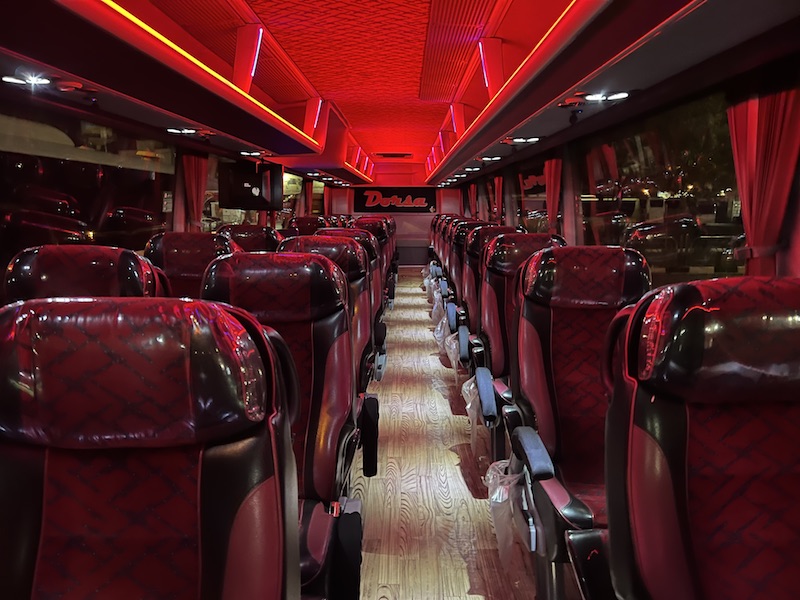
The cheapest and most comfortable way to travel between cities in Iran is the bus. If you are going to travel by bus in Iran; iran.1stquest.com You can check the bus stops, prices and times on the website. However, you cannot buy bus tickets from here or any other application without your Iranian credit card. I asked the employees at the place where I was staying to book bus tickets for me or to buy tickets online, and I paid them the ticket price in cash.
Although the bus ticket prices in Iran vary according to the distance, the price of my Shiraz-Tehran bus, which took 12-13 hours, was around 4-5 Usd. In crowded times, you'll probably pay up to 7 Usd for long distances.
When buying a bus ticket in Iran, make sure that the ticket you buy is a VIP. In VIP buses, the distance between the seats is very wide, the reclining angle is very wide, there is a single seat option and the bus seats are really comfortable. Before the pandemic, there was also a biscuit-tea treat, but unfortunately, with the pandemic, they disappeared.
Another point to consider when buying a bus ticket in Iran is which terminal in the city your bus departs from. For example, there are four bus terminals in Tehran and three in Isfahan. Especially when you get on the bus, it is important that you know your departure terminal correctly.
I have to say that buses always leave late in Iran. I have never come across a bus that is less than half an hour late.
Traveling by Plane in Iran
One of the transportation options in Iran is by plane, as the distances within the country are long. However, I would like you to know that if you buy the plane ticket from Turkey, you will pay almost twice as much due to the official exchange rate. If you get the tickets for your intra-Iranian flights from the agencies in Iran after you arrive in Iran, you have the chance to get them for the last minute. For example, you can buy a ticket from Tehran to Kerman for 27 Usd or from Shiraz to Tabriz for around 40 Usd.
I have another note about planes in Iran, there are long queues at airports. Everything is slow, so be careful not to be late for your flight.
Traveling by Train in Iran
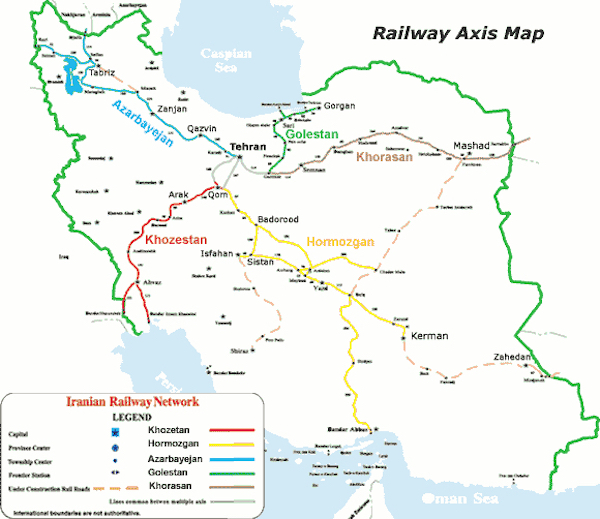
- Map traveltoiran.sbm724.ir taken from the website.
There is a very wide train line in Iran, the map above will give you some idea. It is even possible to travel from Van to Iran by train. Since the train times did not suit me, I did not have a train experience in Iran, so I cannot give detailed information about it.
Internet Usage in Iran
I have come to answer the questions in the minds about internet usage in Iran. First of all, Iran has the internet! Whatsupp, telegram, tiktok and instagram can be used. But there are restrictions to Facebook, Netflix and Youtube. If you want to use these applications, you need to use a VPN. I didn't need a VPN.
Most hotels and accommodations have wifi. However, very few restaurants and cafes have wifi. So if you want to use the internet during the day, it would be good to buy a GSM line and an internet package.
GSM Line in Iran
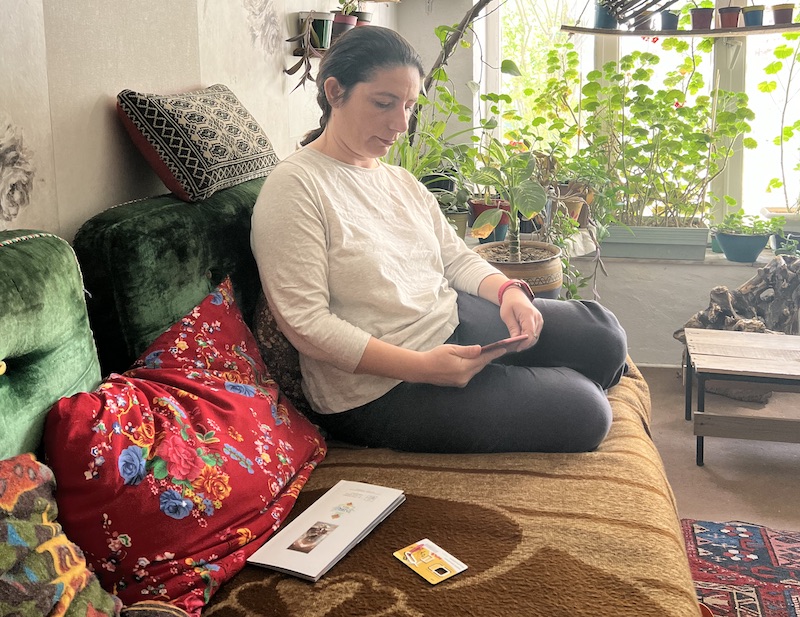
Iran's most common operator is Iran Cell. They have stores in many places. If you are coming to Iran by air, you can get a line from their offices at the airport. Line charges are very low. You can buy a line for 10 TL, but it may take a day for the line to open. You buy the internet package that you think you will use while buying the line.
Since I entered Iran late at night on Thursday and GSM dealers were closed like everywhere else on Friday, I got help from the hotel where I stayed. They give you the prepaid line they take on their behalf, this is a very common practice in Iran, you can ask where you are staying. I paid a total of 15 euros for 5 GB of internet. Good bye.
Attention to Soldiers and Police in Iran
I went from Van to Tabriz by land by minibus. I had waited for the vehicle that brought us for more than 2 hours in dust at the border, and I was quite tired. I had a lunch break in Khoy, the city of Iran close to the border, and relaxed a little when I was full. Since I had just entered Iran, I could not get used to the headscarf issue yet. Even though I don't always cover my head in the vehicle, I quickly learned that I had to cover my head while passing a settlement or at checkpoints.
When we set off again after the meal, I was stunned in the car, and when I realized that we had stopped again, a soldier was asking me for my passport by saying "ma'am, ma'am". When I saw the soldier in front of me, my hand went to my head covering, but I was late. “Of course, you cover your head when you see me…” The voice of the soldier rang in my ears. At that time, when I made eye contact with an Iranian girl in the car, I realized that I was late.
We were at a checkpoint at the exit of Khoy city. The soldier took the passports of everyone in the van and left. Since he came back, I and another foreign woman were told to "get out of the car, give me your phones". At that time, I looked at the driver of the vehicle, tried to say "what's going on" with my eyes. "They're just going to ask a few questions, nothing," he said.
He brought us to the door of the office made from a container, said "wait here" and entered the soldier. What goes in, what goes out, is unclear. Some of the soldiers speak Turkish. By the way, around 9 pm, the weather is freezing. I got out of the vehicle wearing a thin jacket, not knowing what to expect. After waiting in front of the door for half an hour, "It's cold, will we wait more?" When he asked, "Enter, wait inside," said one.
There are people like us being questioned inside. They ask why you came to Iran, who are you, what do you do, what do your parents do, what do your siblings do? Nobody is special, other people are being questioned around us. A soldier took someone's phone and started asking whatsupp, instagram, photos, messages, everything one by one. At that time, I said to myself, "we fucked up". Because I took a lot of photos and videos at the border. If they see them, I say they will not leave me. After waiting inside for almost an hour, exhaustion settled down, I'm waiting for my turn like a sheep.
Finally, when it was my turn, the classic questions began. Why did you come, what do you do? When I said I am a travel writer, the soldier's attitude towards me became more polite. "Where did you go?" he said, “There are more than 60 countries, shall I count them?” I said, "say" he said. I count, he takes notes. When I count them all one by one, he says, “Have you been to America?” said. “I got a visa, but I haven't gone yet,” I said. “Israel?” I said, “I did not go” even though I went. He said "pick up the phone" and handed me the phone, I entered my password and gave it back. I don't know what he was looking at, but he took a quick glance at the phone and handed it back. "You can go out, you're done," he said.
A soldier in the room who had never spoken Turkish (I thought he didn't) turned to me and said, "Of course, you can come, this place is cheap for you, isn't it, my bull is coming to people like you". I pretended not to hear and left the room. I knew that if I got into a quarrel with that soldier, I would get in trouble, that they would detain me for no reason.
When I got back to the minibus two hours later, we made eye contact with that Iranian girl again. She said, "Imagine how those who treat tourists like this treat us." Over the next two weeks, I heard many similar phrases from Iranians.
Unfortunately, this beautiful country with a deep-rooted culture is currently governed by an oppressive regime and you should know what can happen in such a country.
Attention to the “Taarof” Tradition!
If you are going to spend time in Iran, you need to learn the Taarof tradition. I am not sure if there is an equivalent in Turkish, so I will explain the taarof to you with examples.
When I wanted to pay for the accommodation in the hotel I stayed in Tabriz, I was met with a reaction like "You are our guest, you do not need to pay anything". Of course, I was surprised, but I insisted, albeit by force, and made my payment. Later, a girl who bought a bus ticket for me didn't want to pay for the bus. She said, "This is our duty, you are our guest, we can't take any money from you." I insisted again, I paid the apocalypse. As the number of cases like this increased, I realized that there was something strange. Then I learned that they call it taarof. They won't want to take it, you will insist and pay your money. Well, I don't know what happens if you take it seriously and don't really pay. It's like the "I don't want it, put it in my side pocket" situation. However, they say so sincerely and casually that you really think that they will not take money from you. You still insist on your payments in Iran.
Welcome with Flowers
The first time I went to Iran was by plane, it was very interesting to me that those who greet the people who got off the plane at the airport greeted them with huge bouquets of flowers. Sometimes it's artificial, sometimes it's real, but it's definitely a flower bouquet-basket. I don't know if this tradition still continues, but if it does, I really liked it.
Bidet nozzle
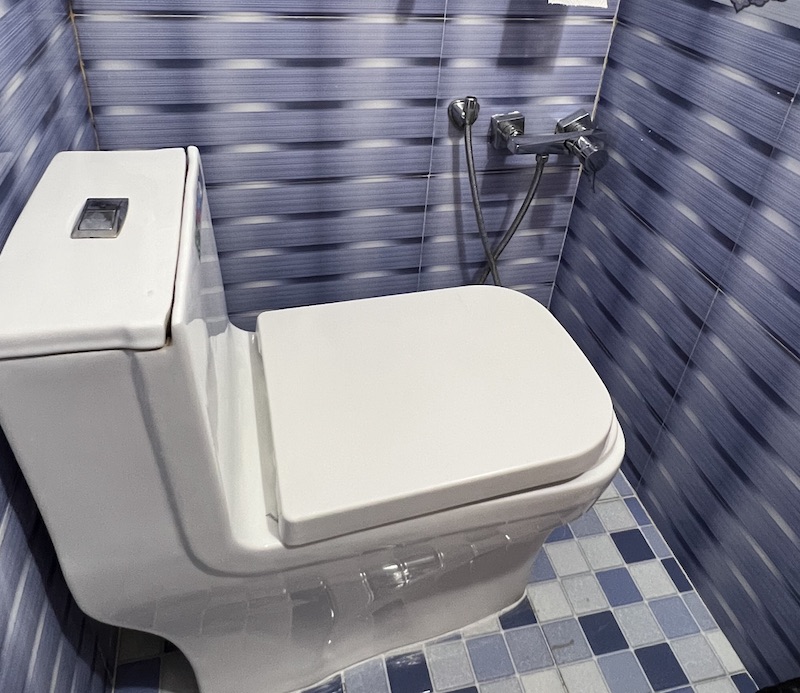
I think the biggest invention made in Turkey is the bidet faucet. Although westerners claim that it is not healthy, it is a very ergonomic and practical solution. There is a bidet in Iran, albeit a different model than ours. They have solved the issue of bidet with a fountain next to the toilet and a hose instead of a shower head.
Still not as ergonomic as ours, similar to Middle Eastern ones. At least there is.
Iran is not an Arab country
Iran should definitely not be thought of as Arab countries. Cities, streets everywhere are sparkling clean and well-maintained. The country is getting poorer, but nowhere is there a dirty or miserable image.
Iran is an extension of the great Persian (Persian) Civilization, they are very different from the Arabs in terms of culture and appearance, and they express this at every opportunity. They are also very uncomfortable when they are called Arabs.
Tea Culture in Iran
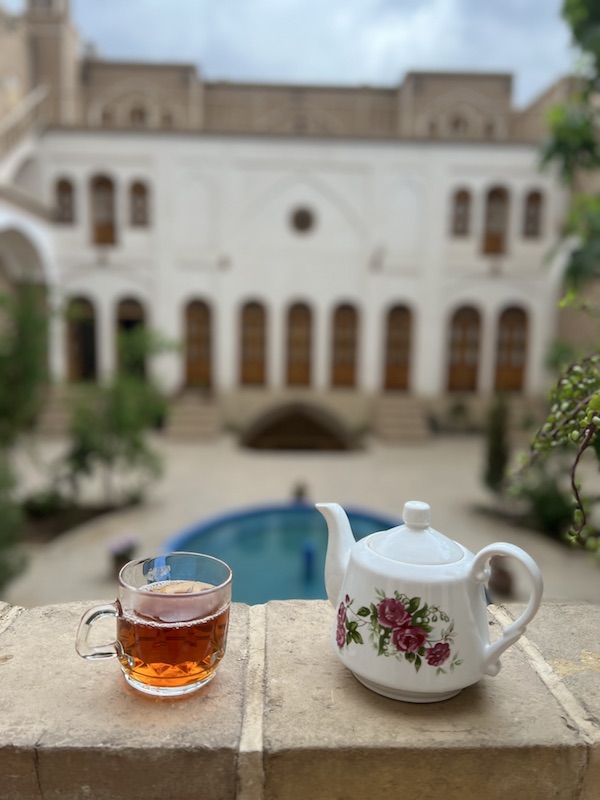
Tea is an integral part of Iranian culture. The teapots are mostly porcelain as in the photo, and sugar or sweets are always served with them. It was also nice to have free tea in every place I stayed. Tea is a very common beverage in Iran, but in our opinion they drink it very lightly, I usually drink all the tea in Iran.
Natural Gas Richness
One thing that caught my attention when I first went to Iran was that natural gas was almost thrown out on the street. It's as if they said that when they couldn't sell their resources, such as oil and natural gas, to abroad properly due to the embargoes on Iran, they said "Let's spend it lavishly". On the subject of energy wastage, I encountered surprising tables that we are not accustomed to seeing, such as open sockets on the streets, gas stoves that heat the street with natural gas.
Iranian Hospitality
In general, Iranians are very hospitable people. When you start chatting with anyone, he will either want to treat you to tea or invite you to his house. When I first heard it, it was quite strange, because while walking on the street, he noticed that I was speaking Turkish and asked, "Did you come from Turkey?" At the end of the chat that started, I was invited to the house for tea. Over time, when I heard this from many people, I understood Iranian hospitality more clearly.
Clothing in Iran
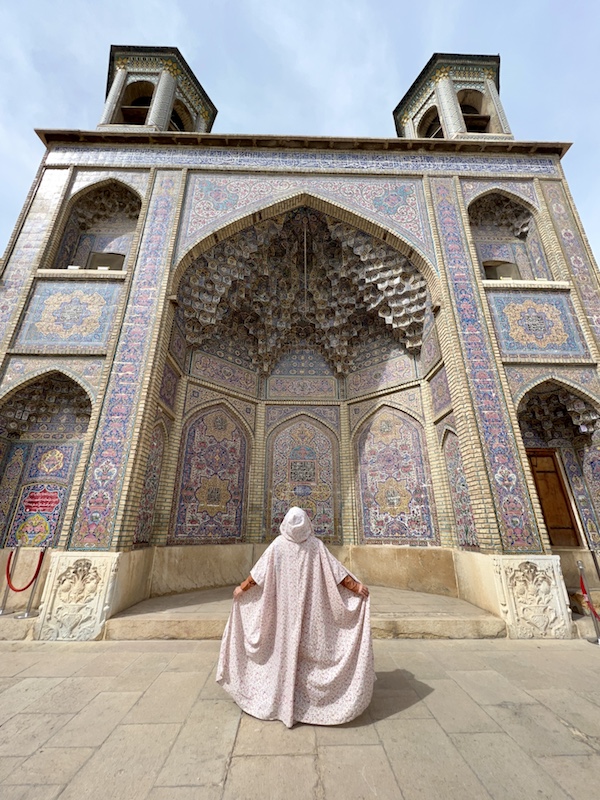
When you go to Iran as a woman, the first thing you should pay attention to is your dress. Even if you go to Iran as a tourist, you have to cover your head as a woman. This mandatory closure doesn't have to be a very tight head covering. It is enough to cover your head with a shawl and the back of your hair is covered, your front bangs and the front of your hair can be seen, no problem.
Another issue that you should pay attention to as a woman is that you should wear clothes that do not reveal your body lines. If possible, it is ideal to wear a loose, tunic-like outfit that covers your hips, and wear trousers that are not tight underneath. No one warns you when you don't wear these, but it is best to comply with the general rules of society in order not to be disturbed by the looks of everyone, men and women.
For more information Being a female traveler in Iran You can also check out my article about it.
Weekend Vacation in Iran
Weekend holidays in Iran are Thursday-Friday, not Saturday-Sunday as in ours. Do not forget to take this into account when making your holiday plans to Iran, otherwise you may see that the places you go are closed and you may be upset. Places such as museums and banks are closed on Thursdays and Fridays. Especially on Fridays, the day that coincides with Sunday, the bazaar, the shops, and many places are completely closed.
Books to Read Before Going to Iran
Before going to Iran, you can read the following books and get preliminary information about Iran:
- Özcan Yurdalan – Wooden Bell Bowl
- Zafer Bozkaya – Iran Travel Guide
- İlber Ortaylı – Iran through the Eyes of İlber Ortaylı
- Josaphat Barbaro – Travel to Anatolia and Iran
- Özcan Karakuş – Unknown Iran
There are many places worth seeing in Iran, since the distances are long, it is necessary to spend a lot of time and travel for a long time.
If you are interested in different civilizations, Iran is a country that should be included in your travel plans.
Stay on the Road!

18 Comments
have a nice day. Thank you so much
Hello there
You didn't mention the food in the article.
have a nice day.
Although such an introverted, oppressive regime is bad in the continuation of the ancient culture, I think Iran should definitely be seen for us travelers. It's always on my mind, but I never had any luck. But as a result of the shares, my departure was depressed and clear in my head.
I'm grateful Iran is a country you will enjoy very much, I hope you will go as soon as possible.
Great and fluent writing. Well done to your pen.
Thank you so much
Hello, friends, you are coming to Iran, but you cannot see Iran properly. Because you want to travel at the cheapest cost. There are places in Iran with history, culture, interesting places, even Iranian citizens do not know. Please talk to a guide before you come, with a good program, Iran is very you can travel better.instagram:@tehran_gezi_rehberi can help you for free
Hello Sevil,
Is it dangerous to go to Iran as a solo female tourist?
http://cokokuyancokgezen.com/iranda-kadin-gezgin-olmak/ You also read my post.
Traveling in Iran as a foreign woman may cause you to be the center of attention of men, it is better to be cautious.
Hello there
I am planning a trip to Iran. You have written very well and concisely. How much should I budget for 5 days? There are tours for 4 nights and 5 days. 800 €. It cost me a little high, but I can't be sure.
Thanks
The tour price was really high.
Transportation, eating and drinking are very cheap in Iran. Grab a cheap ticket and go. Let the stone crack for 5 days, you will spend 500 TL 🙂
Hello,
I am also planning to travel to Iran in April 2014. I am curious about your route and information about where you are staying. With love…
Hello,
I went for 4 days. I visited Tehran, Kashan and Isfahan.
If I had time, I would love to see Shiraz and Persepolis. Maybe I'll go back for them.
I determined the hotels by contacting the hotels recommended on Tripadvisor by e-mail or phone. The hotel was not a problem as I already spent 2 nights on the road.
I am sure you will like Iran very much. Have a nice trip
Thank you very much for the information. I look forward to your future trips. With love..
It was very nice, I really liked the way you talked sincerely, I hope you continue to follow your dreams.
Thank you so much 🙂
Sevil, you have summarized everything very well. I really liked Iranian mosques in terms of architecture. The mosaic mirrored coatings and the reflections of light in it are extraordinary. Also, mosques are not only for men, it is possible to see women in mosques almost everywhere. Especially in the mausoleum areas, women are even more in the majority.
Iranians like to go out at night. Men and women, people are sitting in the parks, on the streets, on walks until late. People do not hesitate to make eye contact, people's eyes are not on the ground or on their phones, as in the metro and buses in our country, everyone is looking at each other, especially if it is noticed that you are a foreigner, everyone looks at you 🙂
Thanks for the additions Kemalcim 🙂